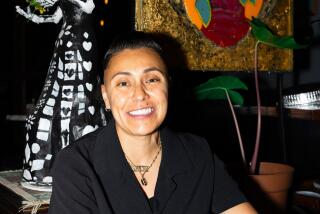Girl’s downtown ditties put spring in their step
- Share via
Aleah Nahue drags a chair onto the sidewalk and pulls her accordion from its case.
All around her, Los Angeles is singing. Helicopters hum, sirens bray, buses wheeze. With nimble taps of her 10-year-old fingers, Aleah adds her melodies to the soundtrack of the street.
She plays melancholy German waltzes and upbeat Mexican ranchera ballads. It’s old-fashioned music, not what you’d expect from a middle-school girl in skinny jeans and pigtails, and it makes the people who travel this block smile.
“It entertains people,” Aleah explained. “And also, it entertains me.”
Some kids spend their summers at camp. Aleah spends hers here, sitting outside her mother’s office near the corner of 2nd and Main streets, putting in hours of practice on her instrument.
One day last week, a homeless man dropped $5 into the velvet-lined instrument case lying open at her feet. Another man, in black cowboy boots, stopped and playfully pinched her ample cheek.
“Siempre bonita,” he said.
From her sidewalk perch, Aleah is privy to the many different lives playing out downtown. She watches delivery guys and dog-walkers, meter maids and police officers, homeless people and City Hall staffers in three-piece suits.
Occasionally, Aleah’s mother peeks out of the office to check on her daughter. Lourdes Nahue Fallis, 48, who is from Peru, works at an office that helps immigrants fill out their paperwork to become citizens.
Fallis began bringing her daughters Aleah and Joane, 14, to work with her when they were still babies. When they got older, Fallis brought them during summer break.
At home in Reseda, they’d probably waste their days in front of the television, Fallis figured. At least when they’re downtown, she could prod them to walk to the library or practice their music.
Aleah and Joane started playing several years ago, after they won free accordion lessons at a music school.
But two girls and two accordions was a lot of sound for Fallis’ small storefront office, so one day three years ago, Joane pulled a chair outside and started practicing there.
“She came back inside with a smile and a dollar in her hand,” Fallis said.
Soon the girls were fighting over who could practice outside — and earn the tips people dropped into their cases.
For a while, Aleah practiced on the sidewalk near San Pedro and 1st streets, where her aunt worked. But this year, with Joane at summer school, Aleah had the coveted Main Street location all to herself.
The people who work on the block look after her. Sometimes, on cold mornings, the baristas at Groundwork Coffee next door give her hot chocolate. On hot afternoons, the wait staff at Pitfire Pizza on the corner slip her cold sodas.
Aleah said she used to be apprehensive about playing before an audience of strangers.
“But after I got used to it, I saw that the music made them happy,” she said. “And that made me happy.”
Once, while she was playing, a couple who were walking by stopped, put down their things and started dancing right there on the street.
Double takes are common. Last week, a man gave her a curious look. Aleah was taking a break. Her gold accordion, which weighs about 10 pounds, was resting on her lap.
“Hi,” the man said. “You know how to play that thing?”
“Yeah,” she said.
“I don’t have any money,” the man continued. “But can you play a little bit, so I know how good you can play?”
She heaved the instrument into her arms and launched into a Mexican folk song, “Las Gaviotas.”
The man, Charles Essan, gazed on.
A thin fellow, with professorial wire-frame glasses and tattered, tasseled shoes, Essan, 48, said he is homeless and living at the Union Rescue Mission.
Originally from the Ivory Coast, he was in his 20s when he lived in Paris, where sidewalk musicians fill the streets and subways with sound.
“Music is something that makes people feel better,” he said.
Aleah played for about three minutes, her fingers dancing up and down the buttons and keys and the beads of her bracelet sparkling in the sun.
When Aleah finished, Essan was nodding enthusiastically.
“Oh, that’s good,” he said. “That’s very, very good.”
kate.linthicum@latimes.com
More to Read
Sign up for Essential California
The most important California stories and recommendations in your inbox every morning.
You may occasionally receive promotional content from the Los Angeles Times.














